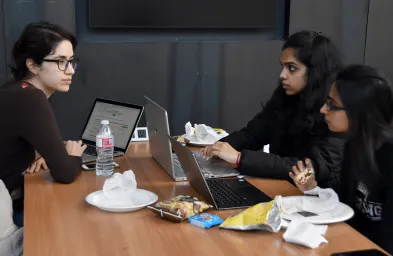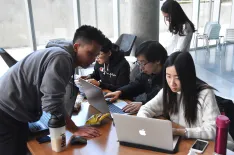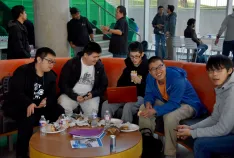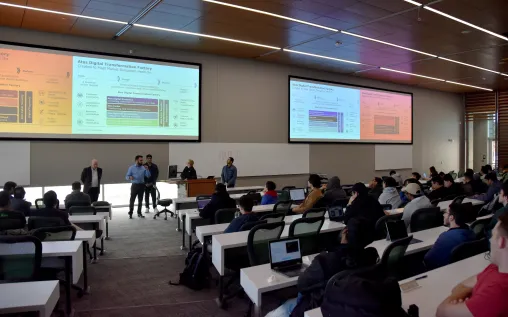UT Dallas CS Department and AI Society Organizes the 2nd HackAI Contest

In today’s data-driven world, Artificial Intelligence (AI) has the potential to transform the economic landscape of the world. As technology continues to grow, AI’s role in our lives will only grow bigger. This November, the student-run AI Society used the opportunity of a hackathon to explore the revolutionary way that artificial intelligence impacts everyday life by hosting the 2nd Annual HackAI.
Amol Mavuduru, Vice President of the UT Dallas AI Society, remarks “HackAI is fundamentally different from other hackathons because it is focused specifically on applying AI and machine learning to develop solutions to real-world business problems.” HackAI is a 24-hour hackathon where students with a passion for AI gather together to implement their ideas, solve problems, and build intelligent applications. Prize money for the awards totaled to $1,350. Approximately 170 students attended HackAI 2018. This year’s HackAI was limited to only UT Dallas Computer Science/Software Engineering students.
HackAI was sponsored by the Dallas Mavericks, CBRE, Atos, SignaPay, DeepCognition, and the UT Dallas Computer Science Department. Atos and Dallas Mavericks were gold sponsors, while CBRE and SignaPay were silver sponsors, and Deep Cognition was a bronze sponsor. Each company sponsor conducted their own hackathon challenges where student teams were asked to create innovative AI applications and solutions that can help improve their company. Leaders from the sponsoring companies served as judges for their own challenges. Chaitanya Vaidya served as the SignaPay judge, Prakash Shrivastava, Shahrom Kiani, Vishal Kamble, Scott Quinlan served as the Atos judges, Sayee Bellamkonda served as the CBRE judge, and Professor Gordon Arnold, Dr. Richard Min, and Dr. Doug DeGroot served as the UT Dallas Computer Science judges. For DeepCognition challenge there was no judging because the submissions were automated. However, Mahesh Kashyap, the Chief Digital Officer of DeepCognition, was on hand to speak with students about their projects and deliver feedback during the judging process.
Below is a brief description of each of the sponsor’s challenges:
Dallas Mavericks: The Mavericks provided 180 GB of NBA game data (including player information and information about the positions of players and the ball at any given time). Students were asked to come up with some useful insights or were tasked to train machine learning algorithms that could perform predictive analytics. The Mavs data was used in projects to train machine learning algorithms or come up with compelling visualizations that summarized the information present in the data.
Atos Challenge: Students were given a dataset of 700 training images of package labels and were tasked to build deep learning models that can identify regions of interest (date, manufacturer information, etc.) and then were asked to categorize (classify) those regions of interest.
SignaPay Challenge: SignaPay challenged students to develop a web form that can use data analytics/AI/ML to determine the likelihood that a particular business is a fraud.
CBRE Challenge: CBRE’s challenge was based on the theme of “Smart Buildings.” Students were asked to develop a solution to a use-case involving AI and/or IOT which could then be applied to Commercial Real Estate Technology.
DeepCognition Challenge: Students were asked to use the Deep Learning Studio, a GUI-based tool that allows users to build DL models without any code and to train models to recognize ten categories of everyday clothing items in images using the Fashion MNIST dataset.
This year’s projects included software that can predict the number of points scored by NBA teams in a game using machine learning, a program that can recommend optimized NBA player rosters using AI, web forms that can identify fraud businesses based on data (SignaPay Challenge), and deep learning models that can recognize familiar images of clothing such as pants, shirts, dresses, etc. (DeepCognition Fashion MNIST Challenge). The Fashion MNIST dataset, which was used in the DeepCognition Challenge, is commonly used in ML research as a benchmark for algorithm performance. Several of the winners in the DeepCognition Challenge surpassed the benchmark established in research.
The following are the winning teams:
- SignaPay Challenge
- 1st Place: Hack A Ton
- 2nd Place: Data Maniacs
- 3rd Place: First Guard
- Mavericks Challenge
- 1st place: Predicting points scored by NBA teams
- 2nd place: AI-optimized rosters
- CBRE Challenge
- 1st place: Data Maniacs
- DeepCognition Fashion MNIST Challenge (Top 6 Winning Individuals)
- Mohammadreza Haghpanah
- Sankalp Bhandari
- Cucumis (username available only)
- Smita Ghosh
- Parva Shah
- Viraj Mavani
- Atos Challenge
- 1st Place: Binglin Huang and Yiming Zhou
- 2nd Place: Richard Gatchalian, Usaid Malik, Hari Prakash Sarathy, and Hisham Raed Alsamarai
This is the second hackathon organized by the UT Dallas CS Department in the HackAI series. The first HackAI hackathon was organized in November 2016 and was focused on common sense reasoning.
Click here to view all the photos from HackAI 2018.




ABOUT THE UT DALLAS COMPUTER SCIENCE DEPARTMENT
The UT Dallas Computer Science program is one of the largest Computer Science departments in the United States with over 2,800 bachelors-degree students, more than 1,000 master’s students, 190 Ph.D. students, 52 tenure-track faculty members, and 41 full-time senior lecturers, as of Fall 2018. With The University of Texas at Dallas’ unique history of starting as a graduate institution first, the CS Department is built on a legacy of valuing innovative research and providing advanced training for software engineers and computer scientists.




